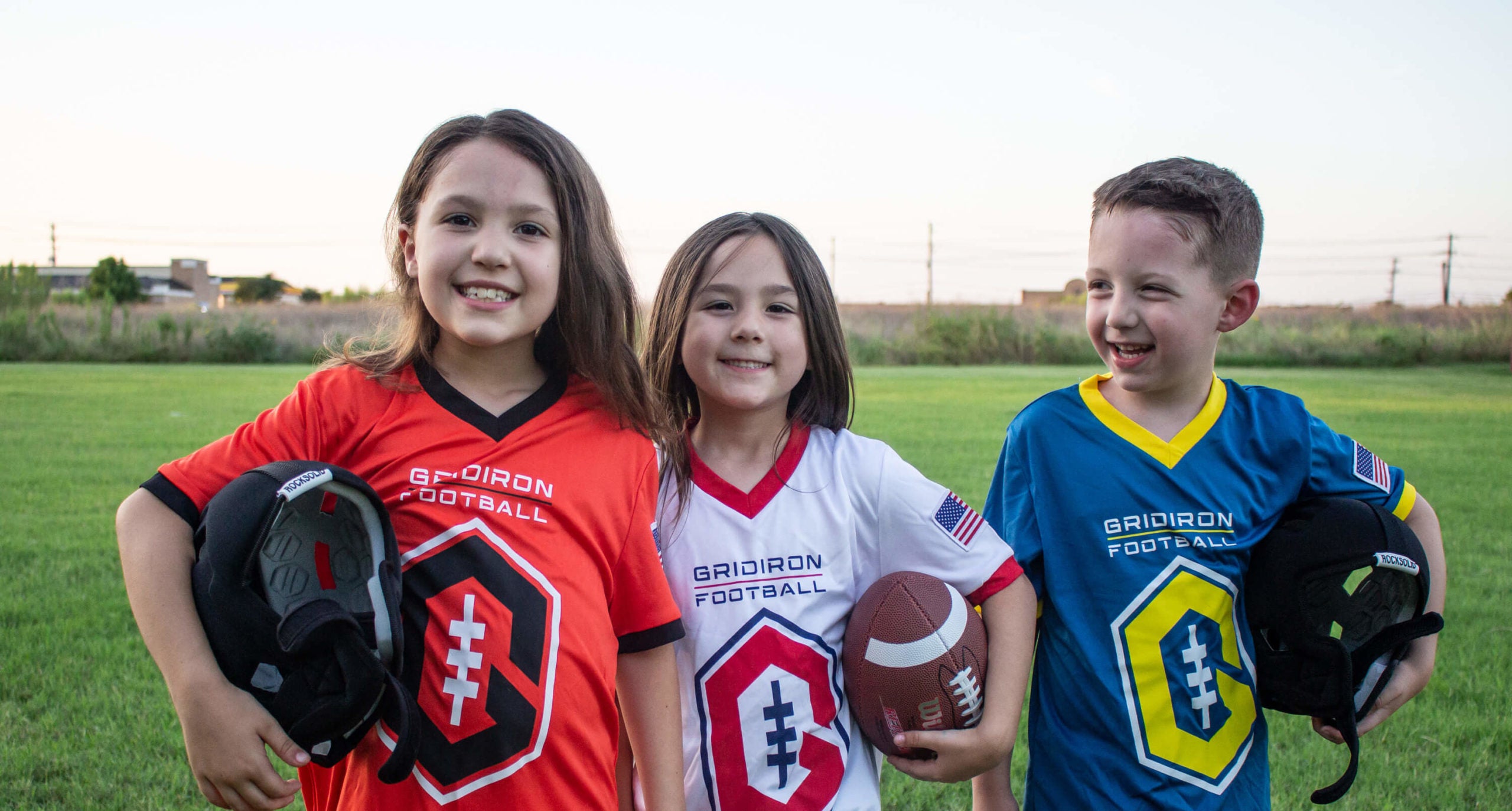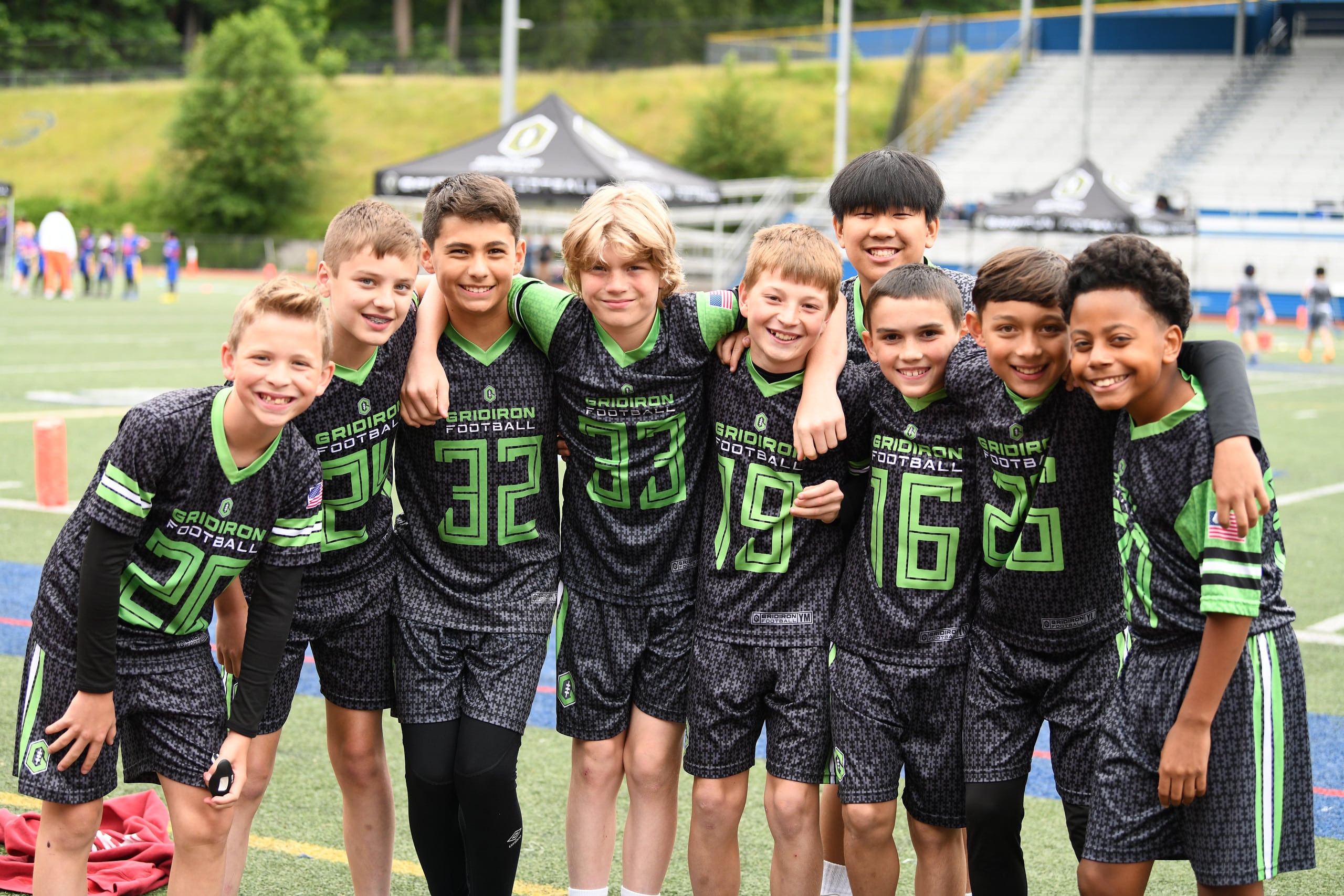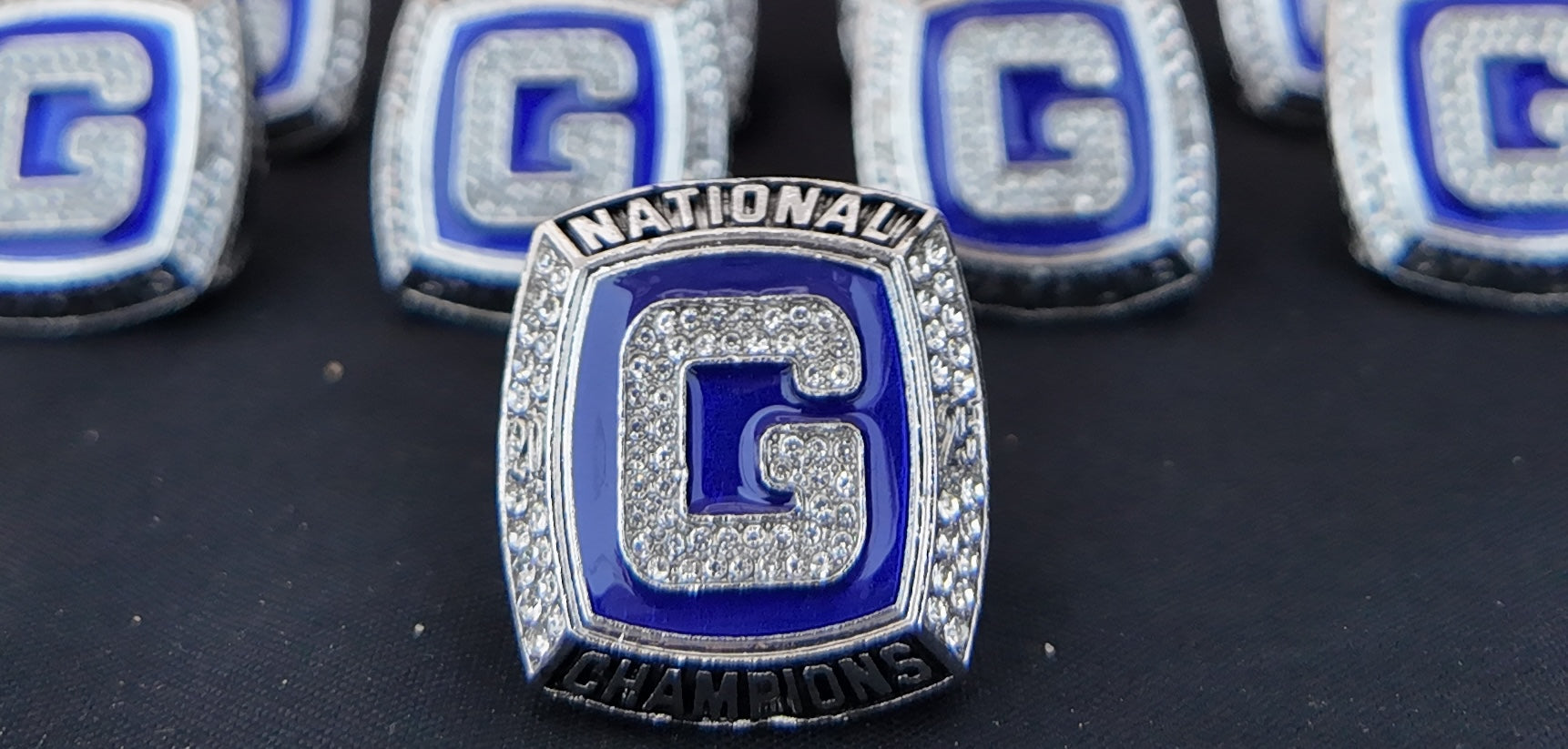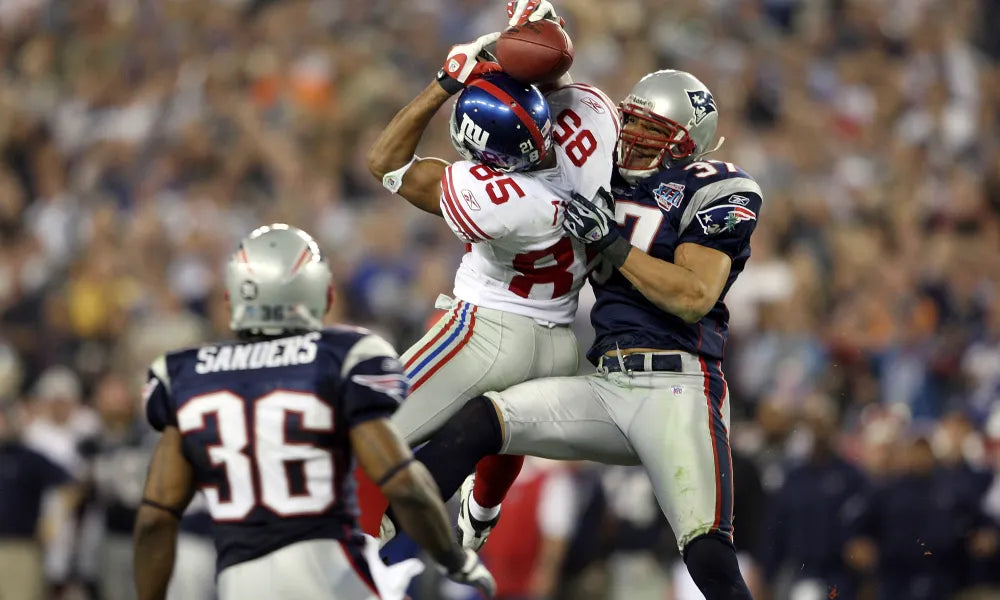Football is known as "America's Sport". And today, non-tackle playing styles are among the fastest growing sports in America. At the top? Flag football. Between 2017 and 2019, flag football participation increased by 38% among youth athletes (6-12 years old). In fact, there were more flag players in this age group than tackle players!
Here are 4 things you may not know about football for kids:
1. Gridiron Football is safe for kids
At Gridiron, we take pride in the safety practices and measures that have been implemented to reduce the risk of injury. Football for kids might make some parents pause to wonder, “Is this the right fit?” Because of this, we deliver a safer and all around more fun experience.
The game styles used and developed by gridiron are not only some of the best environments to train in, but the safest way to get your child into football. This is because of the overall lack of contact, while still offering the skill development necessary for them to grow as a player while avoiding injury in the off season. There is no game play where tackling is allowed, so the risk of injuries like concussions is much lower than in full contact alternatives.
A CDC study published in Sports Health reports youth tackle football athletes ages 6 to 14 sustained 15 times more head impacts than flag football athletes during a practice or game and sustained 23 times more high-magnitude head impact (hard head impact).
Gridiron also offers a safe environment in terms of player experience. Kids will have a positive and fun experience playing Gridiron Football.
Officials are trained and vetted in our hiring process to ensure the best game day experience for everyone. Our strict policies hold everyone to a high standard, whether it’s officials, kids on the field, or parents on the side lines.
Injury Statistics in Youth Football
2. You can help make it a safer environment
Nutrition and Hydration.
Football is a physically demanding sport that will give kids plenty of exercise as they train and practice. That means that keeping your child well hydrated and giving them proper nutrition will be important in preparation and during their season. This remains true as they progress into more intense training periods.
Keep An Eye Out For Injuries.
Kids and teens can be more prone to overuse injuries, so if you are going to help your child prepare for the season with exercise take it easy and keep it simple. Keep in mind that they are still developing and can be negatively impacted by heavy or rigorous training in the long run.
Staying aware of your child’s overall health is a great way to prevent injuries before they happen. This means paying attention to how they are feeling and taking care of any potential injuries as soon as they arise- even if they seem minor. It can be dangerous for them to “walk it off” if symptoms go unaddressed and they don’t get the attention an injury demands. They are still developing, so ignoring an injury or making them tough it out can be detrimental to their health down the road.
When I was high school, I crashed my mountain bike and walked away thinking I had a badly sprained wrist. About a week later my mom noticed it turning purple and took me to the hospital. It turned out to be a fractured growth plate, which could have made that arm develop slower and end up shorter than the other if I didn’t end up with a brace on it.
Kids are resilient and may not be aware of their pain, so You have to keep an eye on their wellness at all times.
Encourage Open Communication.
Encourage your child to pay attention to their body as well and communicate with you about it. They won’t feel safe to do that if you react negatively or even make them feel like a wimp. Open communication should be encouraged so they know they can come to you when they have an issue. It always confuses me when I hear an injured child say “My mom’s gonna kill me”. During this process, Injuries happen. However, they can happen just walking down the street. They are a part of life, and a kid’s football program is certainly not the most dangerous thing your child will do in their lifetime.

Safety Equipment.
Help your child be prepared with the proper safety equipment and make sure everything works and fits as it should. Make sure their helmet fits properly, make sure they have and use their mouth guard every time. Providing for their safety needs is a great way to make sure they know you are supportive of them and want them to succeed. This will be an experience they remember through their lives, so invest in them!
Bumps and bruises happen.
You may be understandably hesitant to register your child into any physical or intense sport, out of concern for injuries. So much is implemented here at Gridiron to reduce the risk of injuries that it is a safe environment, but things do happen. Kids trip, miss steps, and bump into things just in daily moving around. All those bodies moving around in space can result in occasional accidental contact. While Gridiron is a safe environment that mitigates the risk of injury, understand that they are a possibility. However, kids grow tougher as a result of the normal bumps and bruises they will get through life. Ultimately these experiences benefit them as they learn to cope and adapt to challenges in life.

3. Focus on Making it a positive experience
Know your goals
- Why are you looking to enroll your child in a football program?
- Do they want to be there?
- How far do they want to go in football?
- Are you supportive of them?
- It is so important that you understand What your child wants to get out of the game. Do they just want to have fun?
Youth Football is for kids
- Let your child get as into or not into the game as they want to be.
-
Let the coaches be in charge of your kids while on the field.
- It’s a great thing for parents to be involved in their kids’ life and interests. You can absolutely help and coach your child in a positive way as they come to you for guidance or advice, but not while the coach is working with them. Leave the coaching to the pros. Between seasoned NFL players and trained and certified referees, your child is in good hands and is becoming a better player.
-
They are doing their best
- It’s probably harder than it looks. Be patient if they make a mistake or fumble a ball. They need unconditional support and they need to know that they matter more than performance. There are far too many kids who go into their adult lives trying to earn their parent’s approval because they never had it, even in their best moments.
Manage your expectations
Encourage them to grow but allow them to have fun and enjoy the process without getting too wrapped up in performance.
We’ve all seen the parents who are even more into the competitive side of the game than their child or even the coaches. That takes the fun out of the game for their child and those around them.
Your child may never play professional football and that needs to be ok. For those wanting to go all the way to a career in football, put into perspective the serious challenge that this is. To put that level of pressure on a child to perform as opposed to growing and having fun can be unhealthy in the long run. While Pro football is a lofty goal that few attain, it is possible, so let’s not discourage it if that is their dream (not your dream). College football is a great opportunity for them to have an education paid for through scholarships. It can be extremely difficult to let go and let them decide what to pursue, especially when it is not what you want them to do, but they are a different person with different interests.
Let it be for your child
Don’t force them to do what they don’t want to do- It should be a good experience for them and for you.
Let your child have the freedom to play whatever sport they want. If they want to try other sports as well, that should be encouraged, since this helps them develop more.
Practice Self Control
At the end of the day, it is just a game! The kids are held to high standards of sportsmanship and behavior. Parents should exemplify this to their kids. There seems to be a stereotype of kid’s parents who act ridiculously, letting themselves act out of their emotions. They are the ones shouting at the coaches, referees, even their own child from the stand.
While it can be hard to stay calm and positive when a game is not going well, It can ruin the experience for everyone when there is a parent shouting at the coaches & referees or even at their own child. Your child is here to grow at the end of the day. Winning and losing are important, but certainly not the most important thing. Focus on what your child wants and needs.
Grown adults behaving poorly is just awkward for everyone at best, so have fun and be a good sport! It’s great to be into the game and want your child to play, but they just want to know that you’re there to support them, so stay positive and cheer them on! If you get frustrated or feel the need to shout some “helpful” advice to an official, child, or another parent, take some time to cool down. It would be a great time to go grab some concessions, a jacket, or just take a walk until you cool off. You can always talk to people once you are collected and can be positive but a game is not worth ruining other people’s day.
It can be extremely embarrassing for a child when their parent behaves poorly. It can also be harmful for the child if the parent behaves poorly toward the child. Your child will likely already beat themselves up about their mistakes in these high pressure settings, so remember that you are there to support your child and help them grow. That means staying positive and encouraging. This may be encouraging them when they’re feeling down and positively coaching them or being there to practice a little extra at home. No matter what it looks like, be sure to make it clear to your child that you are there for them- not a game.
You can get involved and make a difference
Involved in many practices and activities, you can sign up as an official or volunteer as a coach.
4. Kids football is an investment
Time
You will have to coordinate your schedule well around work, school, other children’s activities, and different age groups having practices and games on different days.
Volunteer commitments like coaching also need to be considered.
Money
Gear, equipment, and cost of programs should all be taken into consideration. Price will vary from league to league, as well as playstyle due to different gear requirements. Check the page for your local league or get in touch with your commissioner for accurate pricing of your child’s gear and program expenses.
Return on Investment
- What you get from it- quality time and experiences with your child.
- Time for them to be outdoors and get exercise as opposed to sitting at home watching television or playing videogames.
- A life time of memories, and a stronger bond with your child.
- Necessary structure and routine, as well as helping your child develop skills and grow.
- Something for your child to be passionate about, and a possible future college scholarship or career




Share:
Which Football Program is Right for My Player?